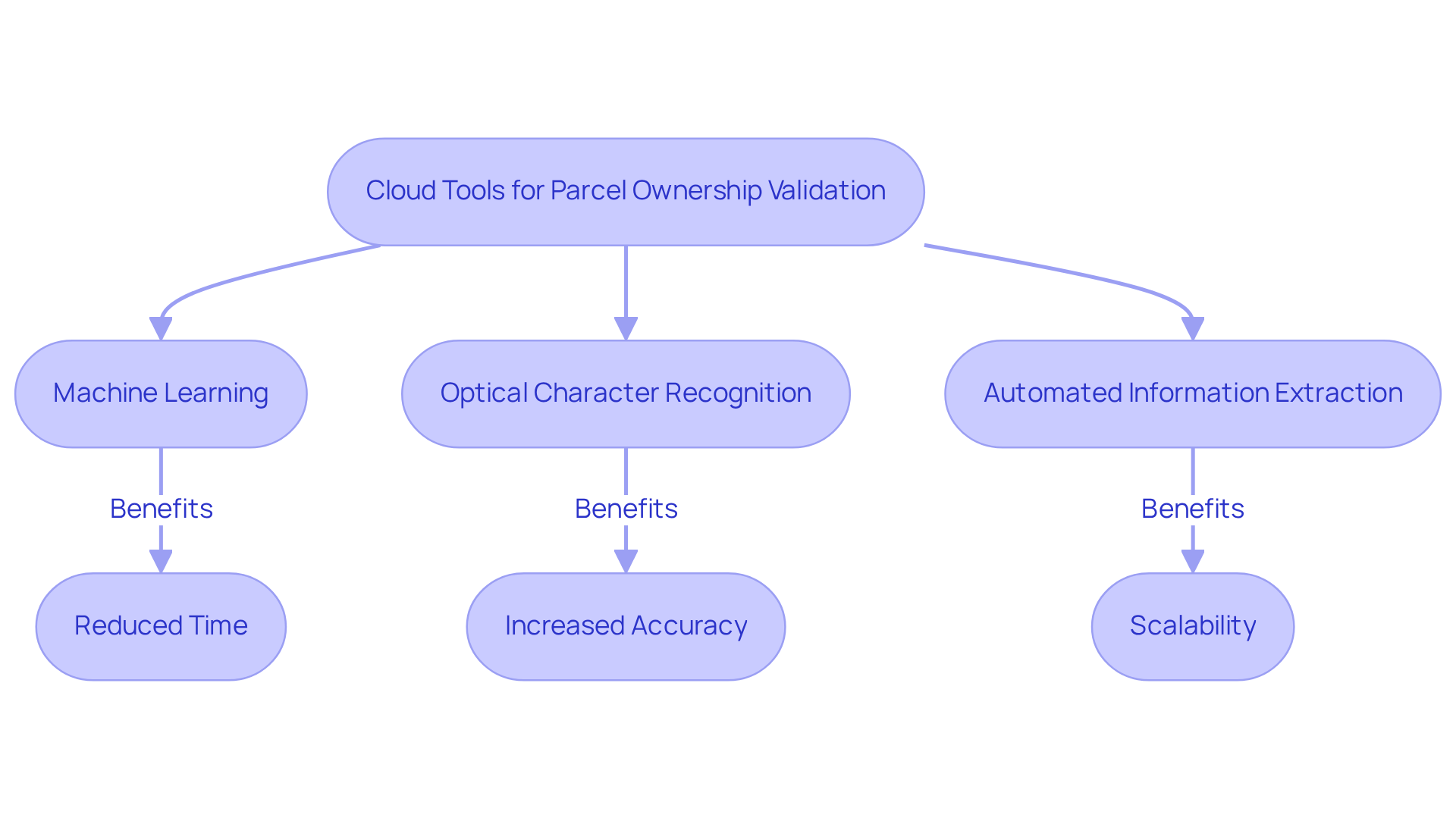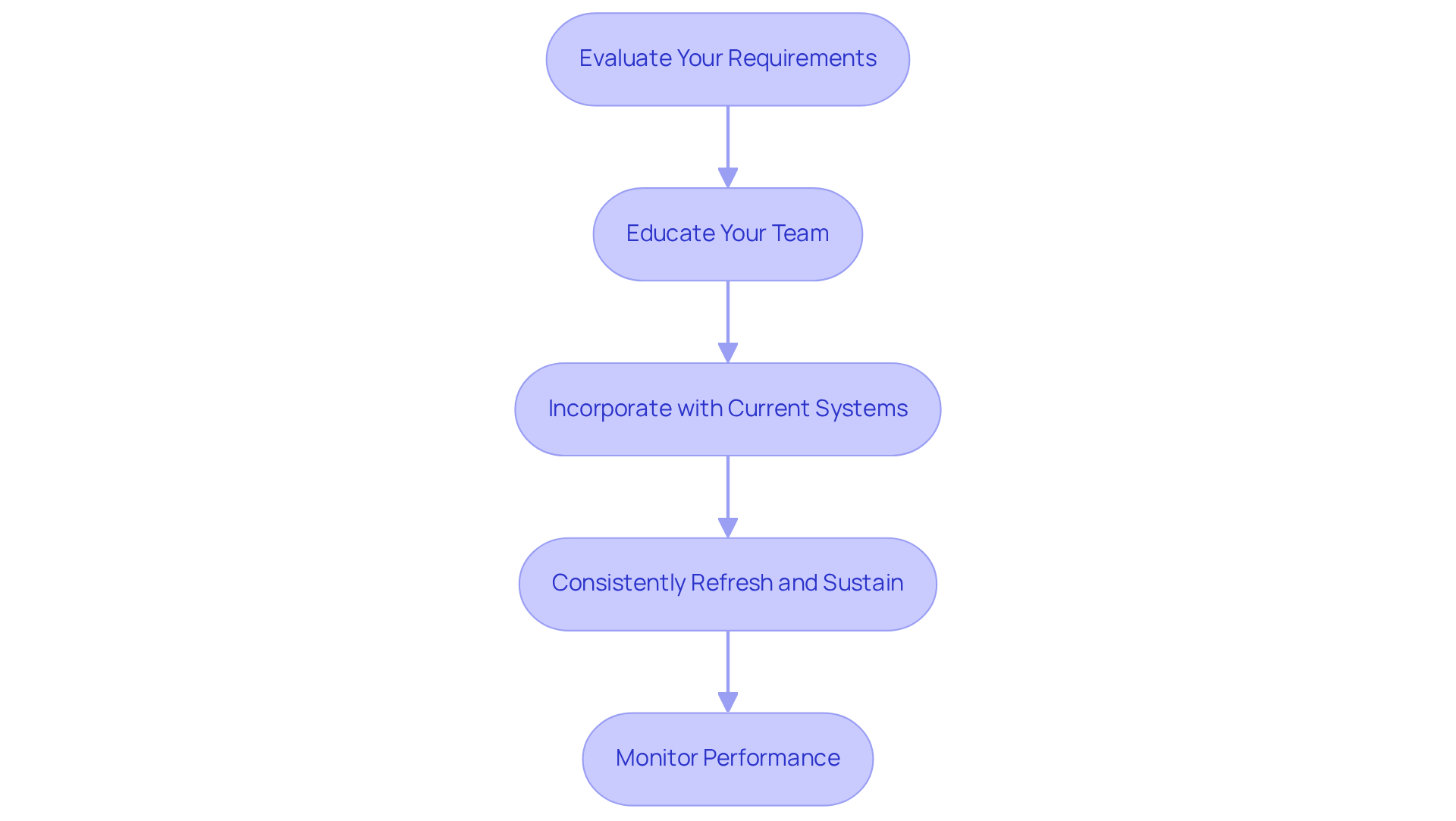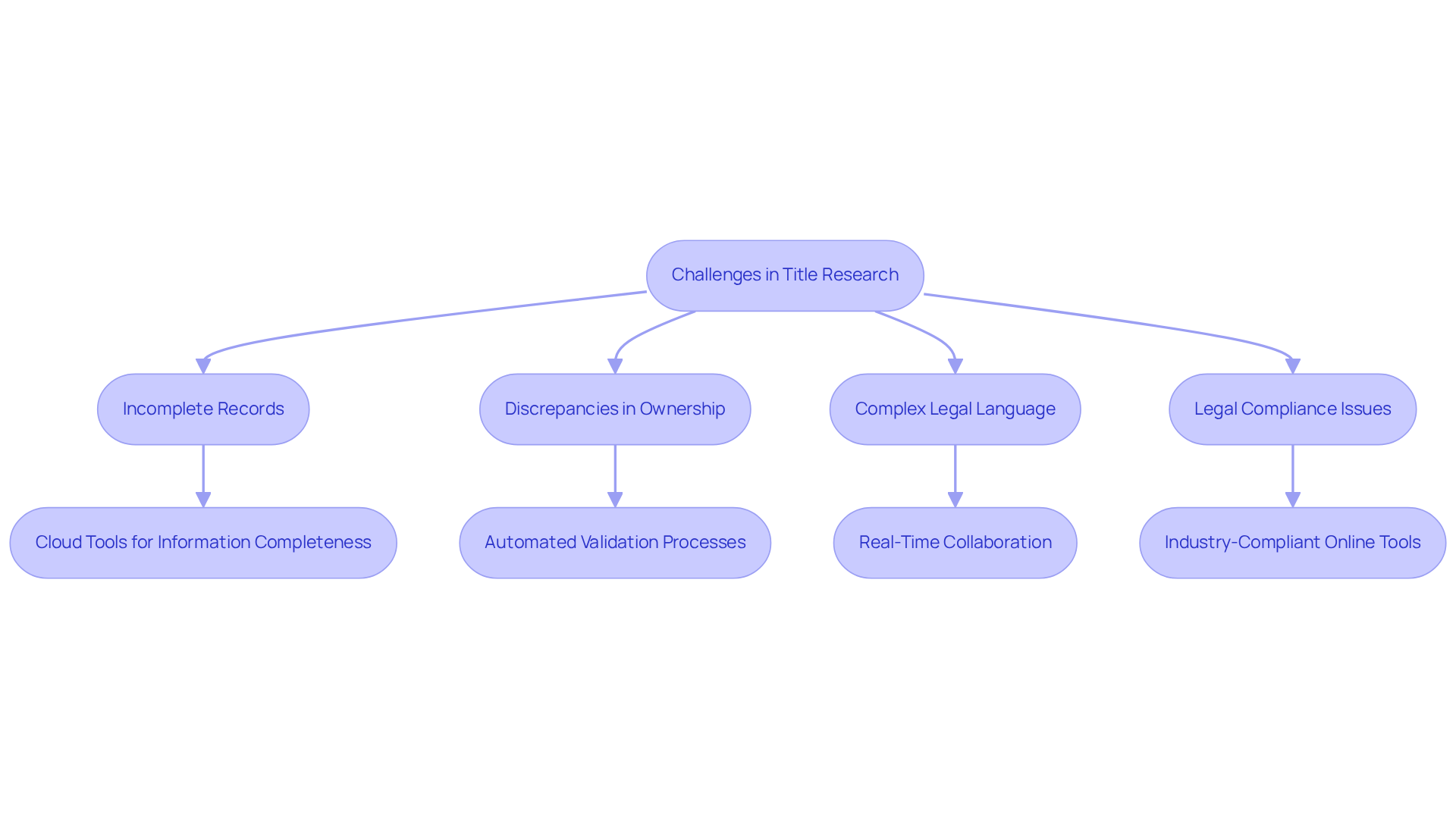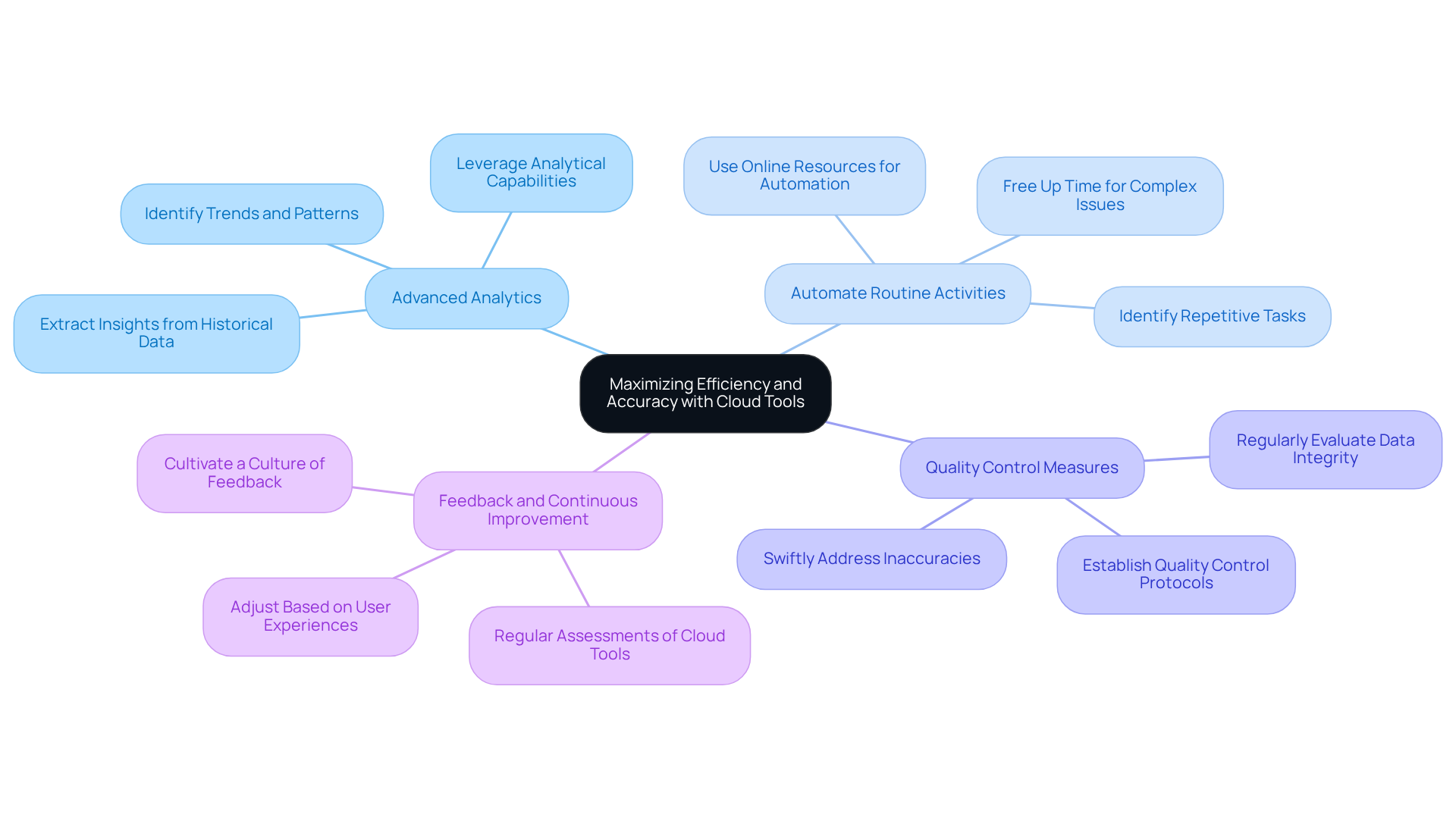Overview
The article emphasizes the critical role of cloud tools in enhancing parcel ownership validation, ultimately improving the efficiency and accuracy of title research.
Accurate title research is paramount, yet it is often hindered by various challenges.
Cloud tools present a solution by automating information extraction, which significantly reduces human errors.
Furthermore, they provide comprehensive insights by aggregating data from diverse sources, enabling a more thorough analysis.
In addition, these tools facilitate real-time collaboration among team members, effectively addressing common obstacles faced in title research.
Consequently, the integration of cloud technology not only streamlines processes but also reinforces the reliability of title research outcomes.
Introduction
Cloud technology is revolutionizing the way title research is conducted, offering innovative solutions that streamline the validation of parcel ownership. By harnessing advanced tools such as machine learning and optical character recognition, these cloud-based systems not only enhance the efficiency of data extraction but also significantly reduce the potential for human error. Furthermore, as the real estate sector increasingly relies on these digital resources, a pressing question arises: how can organizations effectively implement and maximize the benefits of cloud tools while navigating the inherent challenges of title research?
Understanding Cloud Tools for Parcel Ownership Validation
leverage and , to streamline the confirmation of property ownership. These innovative tools from document titles, .
For example, platforms such as employ sophisticated algorithms to analyze extensive datasets, ensuring that . This enhancement not only boosts efficiency but also —an essential factor in the real estate sector where accuracy is critical.
Furthermore, cloud tools for parcel ownership validation provide without incurring substantial infrastructure costs.

Implementing Best Practices for Cloud Tool Utilization
To effectively implement , organizations must adhere to several :
- Evaluate Your Requirements: Prior to selecting a digital solution, it is essential to assess your specific needs, including the volume of data, types of documents, and desired outcomes. This thorough evaluation will guide you in identifying the most appropriate solution with cloud tools for parcel ownership validation.
- : It is crucial to ensure that all team members possess adequate skills in utilizing the chosen online resources. This encompasses a clear understanding of the functionalities, data input methods, and common troubleshooting techniques.
- Incorporate with Current Systems: Choose cloud tools for parcel ownership validation that can seamlessly integrate with your . Such integration minimizes disruption and significantly enhances overall efficiency.
- Consistently Refresh and Sustain: Regularly update your online resources to leverage the . Conducting routine maintenance checks can avert potential issues and guarantee optimal performance.
- : Continuously track the effectiveness of the online resources to pinpoint areas for improvement. Gathering user feedback is essential for refining processes and enhancing usability.

Overcoming Challenges in Title Research with Cloud Solutions
Title research frequently faces considerable challenges, such as incomplete records, discrepancies in ownership information, and the complexities of legal language. Cloud solutions effectively address these issues in several key ways:
- Information completeness is enhanced by , which aggregate information from diverse sources to provide researchers with . This integration significantly mitigates the risk of overlooking critical details that could affect ownership validation. Organizations utilizing online solutions have reported marked improvements in , ensuring that all essential details are readily accessible. According to industry standards, information completeness is one of the six primary dimensions of quality assessment, underscoring its importance in title research.
- : By automating information extraction and validation processes, online solutions significantly reduce human errors associated with manual input. This is vital in legal contexts, where inaccuracies can lead to severe repercussions, including or delays in property transactions. As Bennett Wilkins aptly stated, 'Improved decision-making, innovation, and compliance all depend on one common factor: reliable information.'
- : Cloud platforms facilitate real-time collaboration among team members, enabling quicker resolution of discrepancies and more efficient communication. This capability is particularly beneficial in complex cases involving multiple stakeholders, as [cloud tools for parcel ownership validation](https://astera.com/type/blog/data-completeness) streamline workflows and boost overall productivity.
- : Numerous online tools are designed with industry regulations in mind, ensuring that research processes adhere to legal standards. This compliance reduces the risk of legal challenges arising from improper documentation, thereby protecting the integrity of property ownership validation using cloud tools for parcel ownership validation.
In summary, leveraging online technology not only enhances information completeness but also fosters a more efficient and compliant research process, ultimately benefiting real estate professionals. Furthermore, case studies such as 'Testing DCAP with Hypothetical Information' illustrate how online solutions can effectively manage completeness evaluations, further validating their efficacy.

Maximizing Efficiency and Accuracy with Cloud Tools
To maximize efficiency and accuracy in title research utilizing cloud tools, it is essential to consider the following strategies:
- Employ : Leverage the analytical capabilities of online resources to extract insights from historical data. This approach aids in identifying trends and patterns that are crucial for informed decision-making by utilizing .
- : Identify repetitive tasks within your research process and automate them using online resources. This automation liberates valuable time, allowing researchers to concentrate on more complex issues that necessitate human judgment.
- Implement Quality Control Measures: Establish to regularly evaluate the data managed by online systems. This practice ensures that any inaccuracies are swiftly addressed, thereby .
- Encourage : Cultivate a culture of feedback among team members regarding the utilization of . Regular assessments of the effectiveness of [cloud tools for parcel ownership validation](https://cloud.google.com/transform/top-cloud-computing-trends-facts-statistics-2023), along with adjustments based on user experiences, will enhance overall performance.

Conclusion
Utilizing cloud tools for parcel ownership validation signifies a transformative approach to title research, enhancing efficiency and accuracy in what has traditionally been a labor-intensive process. By automating the extraction and verification of ownership information, these innovative technologies not only save time but also significantly reduce the risk of human error, establishing their indispensability in the real estate sector.
The article underscores several key arguments advocating for the adoption of cloud tools, including:
- Their capacity to improve information completeness
- Facilitate collaboration
- Ensure legal compliance
- Streamline workflows
Best practices for implementation—such as evaluating specific needs, educating teams, and continuously monitoring performance—further highlight the necessity of a strategic approach to leveraging these technologies. Each of these elements contributes to a more effective title research process, one that can adapt to the evolving demands of the industry.
In conclusion, embracing cloud technology in title research is not merely a trend; it represents a necessary evolution for real estate professionals aiming to enhance their operations. By overcoming traditional challenges and maximizing efficiency through automation and advanced analytics, organizations can ensure more reliable and compliant property ownership validation. It is imperative for stakeholders to prioritize the integration of these tools, fostering a culture of continuous improvement and innovation that will ultimately yield better outcomes in the real estate landscape.
Frequently Asked Questions
What are cloud tools for parcel ownership validation?
Cloud tools for parcel ownership validation are advanced technologies that use machine learning and optical character recognition to automate the confirmation of property ownership by extracting information from document titles.
How do these tools improve the process of verifying property ownership?
These tools streamline the verification process by significantly reducing the time and effort needed for manual checks, allowing title researchers to access accurate and up-to-date information quickly.
Can you provide an example of a platform that uses these cloud tools?
An example of a platform that utilizes these cloud tools is Parse AI, which employs sophisticated algorithms to analyze extensive datasets for faster and more accurate title research.
What are the benefits of using cloud tools for parcel ownership validation?
The benefits include increased efficiency, reduced risk of human error, and the ability to scale operations to manage varying volumes of information without significant infrastructure costs.
Why is accuracy important in the real estate sector?
Accuracy is critical in the real estate sector because it ensures reliable property ownership verification, which is essential for legal and financial transactions.




